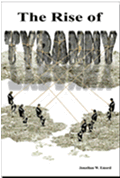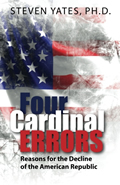ON RON PAUL AND “ELECTABILITY”
By Professor
Steven Yates
January 14, 2012
NewsWithViews.com
J. B. Williams’ article “Why Ron Paul Is Unelectable” contains misinformation but does raise a few questions; thus this effort to sort matters out. I should note before proceeding: I have defended Ron Paul or discussed his thinking in the past here, here, and more recently here. I have written this article because (1) if Mitt Romney’s nomination really were inevitable it is no guarantee, obviously, of a victory over Barack Obama (especially if those who supported Ron Paul decide out of conscience that they can’t support Romney and choose to vote third party or go fishing—like it or not, the GOP needs us); and (2) if Romney is the best the GOP can do, it only guarantees more of the same because—as with McCain vs. Obama back in 2008—the differences are more cosmetic than substantive.
In other words, the anybody-but-Obama rhetoric we are hearing from a lot of conservatives these days is as deceptive as the anybody-but-Bush rhetoric of Democrats was back in 2008. Obama has more in common with Bush than he has differences. He, like Bush, proved to be a creature of the power elite—on Wall Street, in the Trilateral Commission, and elsewhere. He continued Bush’s foreign wars and has even widened them to include Libya and Pakistan—and possibly Iran before near-future events can play out. The hope-and-change rhetoric changed nothing. Likewise, promises of a change in direction coming from the Romney camp will change nothing. We’ll see why before we are done here.
First, let us deal with some misinformation in Williams’ article. Neocon is not an insult. The word is short for neoconservative: a specific political position worked out in detail. One can find the “Cliff Notes” version on Wikipedia and elsewhere. Wikipedia says:
“Neoconservatism is a variant of the political ideology of conservatism which rejects the utopianism and egalitarianism of modern liberalism but sees a role for the welfare state. Their main emphasis since 1990 has been using American power to foster democracy abroad, especially in the Middle East. They were notably visible in Republican administrations of George H.W. Bush (1989-93) and George W. Bush (2001-2009).”
Wikipedia’s discussion continues by noting how the stance was developed by former Trotskyite left-liberals, perhaps explaining how one of its founding fathers, Irving Kristol, could famously describe a neoconservative as a “liberal who has been mugged by reality.” Back in the early 1980s, the term was not an insult. But as it developed, it was clear that neoconservatism retained a good bit of the leftism from which it originally sprung—having made peace with the welfare state, for example, or Keynesian economics, or a good deal of the trappings of political correctness when that became an issue in the 1990s. It was fundamentally a creature of Fabian socialism, created in academic centers of Fabian permeation such as New York University and think tanks such as the Heritage Foundation and the American Enterprise Institute where Fabian ideas hijacked both capitalist economics and conservative politics. Neoconservatism combined these with a violently militaristic view of the world. Accordingly, Carnegie Council for Ethics in International Affairs senior fellow Richard Clarke could describe neoconservatism as having these “main characteristics”:
• a tendency to see the world in binary good/evil terms
• low tolerance for diplomacy
• readiness to use military force
• emphasis on U.S. unilateral action
• disdain for multilateral organizations
• focus on the Middle East
• an us-versus-them mentality."
Is this really conservatism? Should we have problems with it? Neoconservatives believe in a brand of “American exceptionalism” holding that the U.S. both can and should police the rest of the world, that it should intervene in the affairs of other nations including initiating violent “regime change” against foreign leaders who have neither attacked nor threatened us, nor have the technological means of attacking us (Iraq is an example). To be fair, this idea hardly began with neoconservatism—Mohammed Mosadegh was forcibly unseated from his position as Iran’s elected president in a CIA-backed coup back in the early 1950s, after all—but today’s neoconservatives, especially since 9/11, have taken this kind of program further than ever before. All we need as is how many stable democracies neoconservatives have created in the Middle East in the past 20 years? The answer is: none!
The movement’s history of belligerence passed off as conservatism has caused friction between neoconservatives and, e.g., paleoconservatives, or libertarian-leaning Republicans such as those of us backing Dr. Paul. It is probably true that the term neocon has been thrown at some of the other candidates for the GOP nomination as an insult, or at their supporters. I confess to having done this a time or two myself. Mea culpa. Point taken. We should try to do better, to focus on issues instead of on personalities. We shouldn’t have too much trouble, because there are plenty of issues!
Our national debt is pushing $15.2 trillion! This is just the official figure! The actual figure, which would include, e.g., Social Security obligations, is at least five times higher! Republicans cannot blame this on Obama. He hasn’t been around that long. The national debt was $5.7 when George W. Bush took office and $10.8 trillion when Obama took office. Republicans controlled both houses of Congress from 1994 until 2006. Congressional spending did not drop appreciably. Both mainstream Republicans and mainstream Democrats have contributed to the skyrocketing national debt, and neither seems to have any incentive to do anything about it once its people are elected.
Ron Paul promises to do something by immediately cutting $1 trillion from the federal budget. He pledges to end six federal agencies, including the worthless U.S. Department of Education.
But we shouldn’t take these actions, under the admittedly tall assumption that he ever gets to make them, out of context. Ron Paul wishes to take the federal government back to the U.S. Constitution. What does it mean to do this? Is it doable? J.B. Williams understandably wants to know how? One of the main arguments he makes is that Ron Paul hasn’t shown us how he would do anything. To find out whether this has the sting he thinks it has, let’s focus on a specific: the Federal Reserve, which Dr. Paul wants to abolish (one of his many books is entitled End the Fed).
The first thing to note is that Ron Paul has never promised to enact a program and obtain comprehensive results overnight. Such a promise would make him a raving lunatic. This is why he’s introduced bills into Congress aimed at subjecting the Fed to a comprehensive audit. He believes that such an audit would generate sufficient outrage that many besides himself would demand it be shut down—and replaced by a decentralized banking system that would allow both public banks and private ones giving the buying public a genuine choice. Whether Dr. Paul is right about this or not, I don’t know. But what we have learned is that the Fed gave $16.1 trillion to the banking leviathans both American and foreign between December 1, 2007 and July 21, 2010.
Where did the Fed get $16.1 trillion? It created the money out of thin air. Fed bureaucrats entered data into a computer. During this economic crisis the Fed has had one consistent policy: inflate. It hasn’t worked. We don’t have a “real” economic recovery, we have a “technical” recovery—reflected in professional economists statistics but not in people’s lives. For all practical purposes the Fed owns the economics profession in this country. (I am, of course, speaking metaphorically.)
For all Williams’s complaints about how we Ron Paul supporters don’t understand fiat money—or how there isn’t enough gold in the country to support a gold standard—what should be clear is that such practices by the central bank will eventually destroy the dollar. The dollar has lost over 96 percent of its value since the Fed was created in 1913. The loss in value accelerated after Nixon “closed the gold window” in 1971. It is possible to justify money creation to keep up with population growth and genuine economic expansion. But when used as a means to stimulate expansion, the practice is nothing but trouble. The Fed has been generating artificial economic booms since the Nixon years. We know, after the fact, that they are artificial because they always end in “busts”—painful recessions. Artificial booms mean malinvestments and bubbles. A recession is the economy’s “effort” to clear these out. If not allowed to do so, the bubble moves elsewhere (e.g., from the tech sector in the late 1990s to the housing sector in the 2000s). Eventually, though, reality kicks in and the bubble bursts. The housing bubble began to deflate in 2007.
The combination of this with the greed-driven manipulations in the leviathan banks—CDS’s and other derivatives, for example—nearly destabilized the entire financial system in early fall 2008. The fundamentals that gave rise to those manipulations are still in place. The derivatives bubble still exists. It is considerably larger today than it was in 2008. That is why many of us believe the Meltdown of 2008 isn’t over, that we may be in an economy like that of the early 1930s. The Dow had recovered back then as well. Mainstream economists then were heard to say, “The worst is behind us.” They were wrong. Our mainstream economists are also wrong. Always remember: the economics profession is “owned” by the Fed, and therefore by the elite central bankers who have profited massively while the American people have been thrown out of work and, in many cases, into the streets in many cases. Can Ron Paul do anything about this? I don’t know. He certainly can’t wave a magic wand and make economic reality go away. But he could put us on track to begin a necessary reversal of course—necessary because the alternative is economic decline punctuated by more 2008-style shocks and government dysfunction.
A few mavericks among economists have shown that in reality, the country has experienced very little real growth since the 1970s. Paul Craig Roberts is an example. Wages have not kept up with inflation. As a nation we are getting poorer. The descendents of those bankers who created the Fed are getting richer. They represent a tiny minority who have learned to generate “wealth” by moving fiat money around all day. The middle class, meanwhile, is disappearing. The reasons for this are more complex than just Fed policy, of course; but the diminishing purchasing power of our money is an important factor.
We should all thank Ron Paul for having drawn attention to this. Before 2008, few people had even heard of the Fed. Today, its name is verging on becoming a household word. This is true especially among young people who have college degrees but fear spiraling downward into poverty. They move back in with Mom and Dad because they can’t find jobs that will allow them to live independently. They have allowed themselves to be roped into the federally guaranteed student loan system. Loans by definition must be paid back—to the tune of several hundred dollars a month. This requires a decent-paying job. Recent college graduates understandably fear indentured servitude when there aren’t any such jobs, in an economy having entered irreversible decline. This generation is turning to Ron Paul in record numbers. Its members may not have Ph.D.’s in economics. But their noses are telling them this country can’t continue in its present direction without descending to something akin to third world status.
Williams maintains that Ron Paul has misread the Constitution on abortion. He may be right. Ron Paul, we should remember, is probably more libertarian than conservative. His ideal is as small a government as is capable of maintaining social stability. But that still might include protecting life as well as liberty and the pursuit of happiness. I don’t believe for a minute Dr. Paul thinks abortion is morally acceptable. He was a baby doctor before he went into politics. He’s delivered thousand of babies. His seemingly laissez-faire stance on social issues has set many traditional-minded conservatives on edge, however. He does not agree with them that these issues can be settled by force. I tend to agree (I develop my argument in detail here). What will settle them? A change in worldview, not a change in elected officials. The bottom line: a large percentage of the population—I don’t have statistics here, but I am confident it represents at least half—sees nothing morally wrong with first-trimester abortions at the very least. The percentage of those who would deny the abortion option to victims of rape or incest is now very small. Few abortions are performed on rape or incest victims. Most are acts of convenience. Again, mainstream Republicans controlled Congress from 1994 until 2006. They had every opportunity to do something about abortion besides bloviate on the subject and accept money from pro-life groups. They did nothing. To my mind it seems hypocritical for anyone in the GOP to condemn Ron Paul for declaring abortion to be not a federal responsibility.
Williams also sees Dr. Paul—along with many others in the GOP mainstream—as soft on radical Islam, as not seeing the colossal danger it supposedly represents. Those of us who take a heretical position on this issue—that danger from Muslims is not nonexistent but is very much overblown—do so for a very simple reason. “Our” political class has done absolutely nothing to keep potentially hostile aliens out of this country by securing our borders. (Not all illegal aliens are from Mexico, after all!) TSA officials in airports feel up little girls and strip search grandmothers but don’t much bother with Muslims. They would have to engage in “racial profiling” to do that, and we know the sacred canons of political correctness can’t be violated. This joke agency, moreover, has yet to detect a single terrorist, Muslim or otherwise. If Muslims wanted to wreak havoc on American soil, they would have little trouble doing it. There are sports events at major colleges and universities everywhere in this country on almost every weekend of the academic year. Fall football games attract almost a hundred thousand people per Saturday. No such event has ever been hit. No doubt I will get some hostile responses to this. I welcome evidence that Muslims represent the threat to this country that neoconservatives make them out to be, and that our political elites, Republican and Democrat, haven’t created a bogeyman and used it to justify war, war, and more war—not to mention the increasingly repressive domestic police state for which the Patriot Act wrote the first post-9/11 chapter.
The long and the short of it is this: we have, for the first time since 1964 (the year the Republicans ran for president a genuine conservative who understood something of “our” globalist power elite—Barry Goldwater—against the liberal Lyndon Johnson), an opportunity to present voters with a choice between two very different political philosophies based on very different premises about where this country ought to go. One direction promises us more of what we have now (that is to say, more war, more police-statism, more economic dysfunction, and eventually massive tax increases and price inflation). The other promises a slow struggle back to liberty and Constitutionally limited government (it does not promise that this struggle will be easy).
If Williams is right, and Mitt Romney already has the nomination pretty much sown up, then we’ve made our choice, and we’ll have another rearrangement of deck chairs on the Titanic. This is essentially what we had in 2008, once Ron Paul supporters were forcibly ejected from the GOP National Convention. (And Williams wonders why many Ron Paul supporters seem so ticked off?) Perhaps we should note: at present, Romney’s major campaign contributor is Goldman Sachs; in the 2008 election cycle Obama’s second largest campaign contributor was Goldman Sachs. Today, Romney’s former company Bain Capital is one of the primary owners of Clear Channel, in turn the largest owner of conservative talk radio stations in the country. It is true that Romney no longer runs the company; but he has a financial stake in it worth millions (go here). Is it really that surprising that major conservative voices—or voices that call themselves conservative at any rate—are supporting Romney? Follow the money.
In sum: let’s just look at the delegate numbers at this stage of the game—prior to the South Carolina primary. As of this writing, Romney has twelve delegates. Ron Paul has ten. Rick Santorum has seven. Jon Huntsman has two. Newt Gingrich has two. Rick Perry has two. The number needed to win nomination is 1,144. Ron Paul vaulted into second place despite hostility from mainstream Republicans and an initial blackout by the mainstream media. My point: contrary to Williams, this is far from over.
| Subscribe to the NewsWithViews Daily News Alerts! |
This GOP nomination season is a contest between those who have been fooled into thinking Romney offers a real alternative to Obama, and those of us who know better.
However, I suggest we leave this in the hands of the people rather than with trying to decide it a priori. If Mitt Romney does win the nomination, the reasonable conclusion is that America’s masses are either satisfied with the status quo or too public-schooled to think all these issues through for themselves. They will have to live with the consequences.
� 2012 Steven Yates - All Rights Reserved














 Share
This Article
Share
This Article





